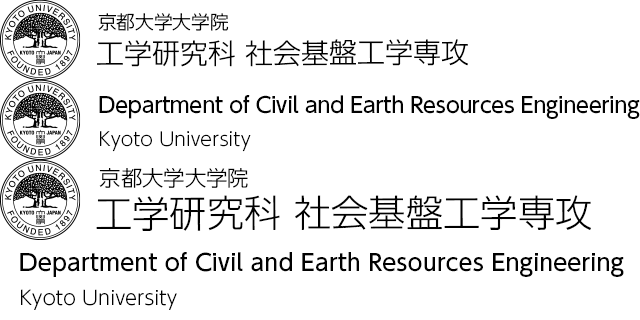Coastal Disaster Prevention Engineering
Japan surrounded by sea has suffered from the lost of human lives and precious estate due to the disaster caused by storm surges, high waves and tsunamis. We have developed the numerical models for the prediction of tsunamis and storm surges and also improved design procedures of disaster prevention structures. We carry out studies of reliability and performance based designs to establish new conceptual design methods and have researched how to determine design conditions of disaster prevention structures taking an optimal design into account.
Academic Staff
Nobuhito MORI
 Professor (Disaster Prevention Research Institute)
Professor (Disaster Prevention Research Institute)
Research Topics
Wind energy transfers into momentum of ocean currents and waves, heat, vapor and gas transfer at the atmospheric and ocean interface. The strong momentum transfer into the ocean causes storm waves and storm surge. Dr. Mori interests the momentum and gas transfer process at the air-water interface and their engineering application.
Contacts
Room E-201D, Uji Campus
TEL: +81-774-38-4146
FAX: +81-774-38-4321
E-mail: lab oceanwave.jp
oceanwave.jp
Tomoya SHIMURA
 Associate Professor (Disaster Prevention Research Institute)
Associate Professor (Disaster Prevention Research Institute)
Research Topics
My research interest lies in climate change impacts on coastal hazard (storm surge, ocean waves and sea level rise). And, I work on development of global climate model with implementing the ocean surface effects in air-sea interaction.
Contacts
Room E-204D, Uji Campus
TEL: +81-774-38-4141
TEL: +81-774-38-4321
E-mail: shimura.tomoya.2v kyoto-u.ac.jp
kyoto-u.ac.jp
Yasuyuki BABA
Associate Professor (Disaster Prevention Research Institute)
Research Topics
Contacts
Shirahama Oceanographic Observatory, Disaster Prevention Research Institute
TEL: +81-739-42-553
FAX: +81-739-42-5532
E-mail: baba uh31.dpri.kyoto-u.ac.jp
uh31.dpri.kyoto-u.ac.jp
Takuya MIYASHITA
Assistant Professor (Disaster Prevention Research Institute)
Research Topics
Evaluation of tsunami hazards for future earthquakes involves a variety of uncertainties, especially those caused by the uncertainty of the source fault. I am currently working on the probabilistic tsunami hazard assessment considering the uncertainty of earthquake sources. Also, my research interest lies in elucidating the response characteristics of tsunamis due to topography.
Contacts
Room E-210D, Uji Campus
TEL: +81-774-38-4142
FAX: +81-774-38-4321
E-mail: miyashita.takuya.4w kyoto-u.ac.jp
kyoto-u.ac.jp
Yuki IMAI
Assistant Professor (Disaster Prevention Research Institute)
Research Topics

In order to provide a comprehensive understanding of climate change impact in coastal area, my research develops a high resolution numerical model and implements ocean circulation to precisely represent wave/current (coastal forcing) and ocean temperature/salinity structure (physical environment), and validates its simulated results compared with observation data.
Contacts
Shirahama Oceanographic Observatory, Disaster Prevention Research Institute
TEL: +81-739-42-4352
FAX: +81-739-42-5532
E-mail: imai.yuki.4c kyoto-u.ac.jp
kyoto-u.ac.jp
Research Topics
Storm surges, wind waves and and tsunamis
Storm surges are abnormal rise of sea level induced by two factors: one is suction force due to air pressure depression and the other is drift shear force due to strong wind speed. The storm surges accompanied by high waves have sometimes damaged storm barriers and have caused large inundation disaster. Tsunami is another issue to be established for long-term impact assessment.
Research works have been carried out to improve prediction models for storm surge, wind waves and tsunamis.
Long-term assessment of coastal disasters
Understanding future changes of ocean waves and storm surges is important for assessing and mitigating the impact of climate on coastal, marine and ocean environments and on engineering problems. We study climate change impacts on coastal hazards. It is expected to increase in extreme values of wave heights and storm surges in the tropical cyclone dominant regions around the middle latitudes of the Western North Pacific including Japan. The influence of future climate change on coastal hazards is discussed considering sea level rise, extreme wave conditions and storm surges targeting the Pacific side of Japan.
Probabilistic modeling of tsunamis
In general, there are two approaches for tsunami hazard assessment, generally. The first is a more conservative deterministic approach which is based on the largest tsunami event and is often termed the “worst case” or “worst credible” tsunami. The second approach is probabilistic tsunami hazard analysis (PTHA) and is analogous to probabilistic seismic hazard analysis (PSHA).
We develop probabilistic tsunami hazard analysis (PTHA) after the 2011 Tohoku Earthquake Tsunami. PTHA mainly is concerned with mega-thrust subduction earthquakes, which can trigger massive tsunamis. Through PTHA, probabilistic tsunami inundation characteristics are evaluated, too.
Laboratory Website
http://www.coast.dpri.kyoto-u.ac.jp/
